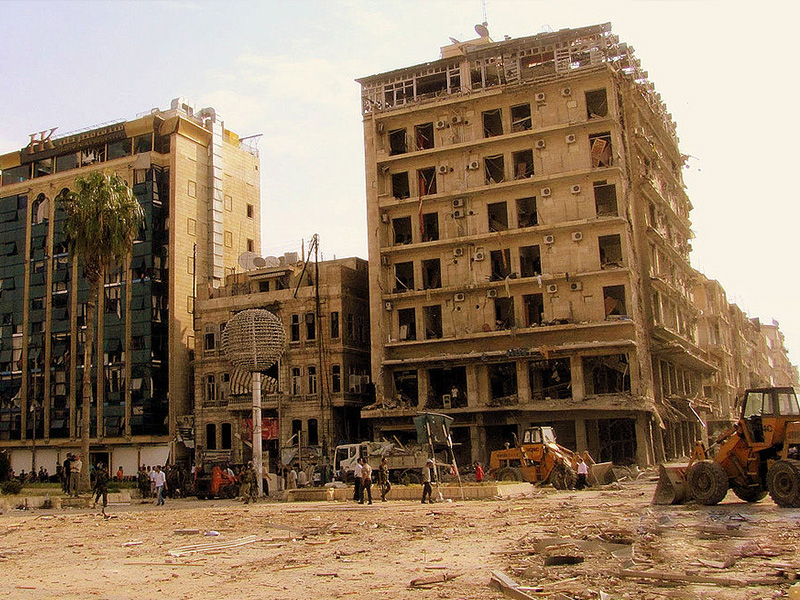The world’s indifference to the ongoing slaughter of Syrians – in particular, the Russian-Assad brutal bombing in Aleppo – is stunning.
Stunning, but not all that unusual.
After all, Russia is well-practiced in eviscerating its opponents. Recall Russian President Vladimir Putin’s carpet bombing of Grozny in 1999 when he decided to teach the Chechens a lesson. His slaughter of civilians was met with virtual indifference by the so-called international community.
He’s at it again – in Syria, where Russia faces no threat but, with Iranian help, seeks to bolster Syrian President Bashar Assad’s regime and reassert Russian power against a diminished U.S. presence. And the world, aware of the extent of Putin’s brutality is, with few exceptions, quiet.
The contrast to all things involving Israel could not be greater. When the Jewish state is faced with a legitimate, indeed urgent, need to defend itself from, say, hundreds of missiles launched from Hamas-led Gaza, and must take measures to interdict the source of those missiles (as in the 2008/9 Cast Lead military operation and the 2014 Operation Protective Edge), it stands accused, almost immediately, of using “excessive force.”
Accusations of “war crimes” typically follow, especially if tragic civilian deaths occur despite Israel’s steps to minimize casualties among people who’ve been deliberately placed in harm’s way by Hamas – in order, cynically, to maximize ensuing condemnation of Israel. It’s an old story.
To be sure, the intense media coverage of the U.S. presidential campaign – and the glaring spectacle the elections became – took attention away from the agony in Syria where more than 300,000 people have been killed over five years, most of them by Assad, now aided by Russia. It’s also true that, with little safe media access to report on the carnage in places like Aleppo, there are far fewer eyes available to record events. Yet, major news outlets, like Reuters, AFP, and the BBC, have nevertheless managed to file from Syria, including from Aleppo. This is not a war without witnesses.
More than anything, it’s a case of widespread indifference. But there are exceptions.
Last month, Natalie Nougayrede began her column (published in the Guardian Weekly under the title “Where is the outrage over Aleppo?”) with these words:
“Where are the demonstrations in western capitals to denounce the brutal onslaught on Aleppo? Around 300,000 people are exposed to carpet bombing, including bunker-busting and fragmentation ordnance.
READ: JEWISH GROUPS PRAISE OTTAWA’S EFFORT TO PRESSURE UN ON SYRIA
“Is the weather so bad [in London] that no one wants to stand on a square, or in front of the Russian embassy? Or does no one care? Does no one think protesting would make a difference?”
Apparently not.
Accordingly, it’s no surprise that there is no flotilla to Syria – indeed there’s not a single boat headed there. The very idea would not even occur to many “progressives” who prefer sending boats to Gaza where it’s trendy and perfectly safe to do so. Why risk your life protesting an actual human rights catastrophe?
For over a year, since Putin came to Assad’s defence by bombing both anti-Assad rebels and civilians in rebel-controlled areas, Amnesty International has repeatedly condemned Russia and Syria for war crimes, including the deliberate bombing of schools and hospitals where scores of civilians, many of them children, were killed.
In mid-October, Doctors Without Borders decried the attack on four Aleppo hospitals in a single day. Not one hospital or medical facility in east Aleppo – the area Assad was to capture from rebel forces – has been spared.
While condemning Putin’s “scorched-earth” policy, the Economist magazine criticized U.S. President Barack Obama, claiming that his inaction made matters worse. Russia has nothing to fear, and so Secretary of State John Kerry’s efforts to work out a diplomatic solution with his Russian counterpart Sergey Lavrov, while seemingly endless and devoid of leverage, took on a pathetic, farcical air.
In the meantime, Syria suffers, thousands die, and the world remains, mostly, silent.
Paul Michaels is CIJA’s research director.
